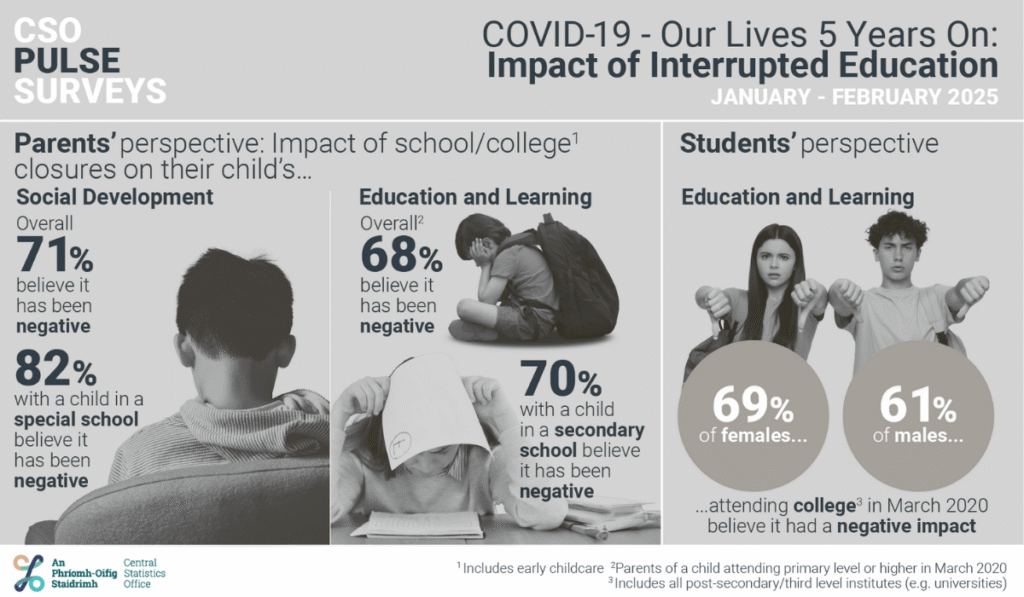COVID lockdown and teen mental health
Five years on since the start of the COVID pandemic, do you feel that your child is still struggling with anxiety, depression or has trouble concentrating?
If any of this sounds familiar — if your young person suffers from anxiety, depression and cognitive difficulties — it may be that school closures, contact restrictions, and curfews contributed to the rise in psychological problems among young people.
Teenagers in Ireland experienced two extended school closures – March-June 2020 and December 2020-March 2021 – more than many other European countries. The lifestyle changes associated with the lockdowns — increased screen time, reduced physical activity and sleep disorders — have negatively affected mental and physical health.
Many children turned to technology to fill the gap left by the lack of in-person interaction, and this has its own set of consequences. The over-reliance on screens has contributed to poor sleep, emotional dysregulation, and heightened anxiety.
Recent Irish studies are shedding light on how teens are faring five years after the pandemic.
Parents’ perspective on teen mental health
👉 54 per cent of parents say they still have challenges with their children’s mental health after the pandemic, with 16 per cent of these saying their child’s mental health has worsened.
👉 Seven in ten (71%) parents believe the social development of at least one of their children has been negatively impacted by the periodic closures of early childcare and educational facilities when COVID-19-related restrictions were in place.
👉 Parents with a child attending a special school in March 2020 are most likely (82%) to report that school closures have harmed their child’s social development.
👉 Almost seven in ten (68%) parents believe that at least one of their children’s education and learning has been negatively impacted by school closures.
👉 Almost four in ten (38%) parents who had a child in a post-secondary/third-level institute in March 2020 believe that closures of these facilities will hurt their child’s future career prospects.
👉 Seven in ten (69%) females who were in post-secondary/third-level education in early 2020 believe that the closures of these facilities have harmed their education and learning, compared with 61% of males.
Adolescents’ perspective on teen mental health
👉 The most commonly reported negative effect of COVID-19 was a worsening of the school experience.
👉 The negative impact of COVID-19 on family relationships was strongly associated with poor mental health.
👉 One in every three transgender and gender-diverse young persons (non-binary and undisclosed) had attempted suicide in their lifetime (36%), and three in four had suicidal thoughts (77%).
👉 Being an ethnicity other than white-Irish and experiencing relative poverty was linked with higher rates of many mental health outcomes, including psychotic-like experiences, self-harm and suicidal ideation and attempt.
How can parents help their teen’s mental health?
Some of the key takeaways are to notice changes in your child’s mental health as they relate to basic self-care (eating, sleeping, socialising, changes in/increased use of substances) and changes in mood (irritability, impulsivity, more fearful than normal).
Check in on your teen and find a pocket of time within a calm and regulated conversation that is occurring to do so. We need to try to keep adult emotions, opinions, and perspectives in check as your child shares thoughts and feelings with you, and validate those feelings.
If you’re thinking of therapy, this could look like outpatient individual therapy, groups specifically for adolescents struggling with a variety of issues, or more creative outlets such as art and dance-based therapies and psychodrama groups.
If you’d like to learn more about our child and adolescent psychiatry services or book an appointment, call 01-5563335, WhatsApp 089-2300366, or book through the link below.


